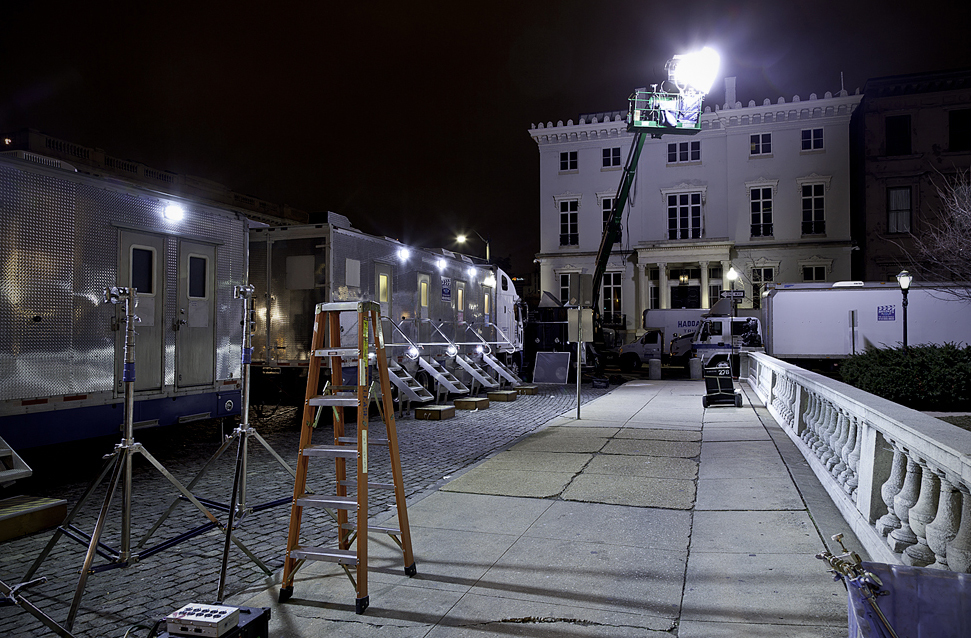
The Baltimore Film Office was created in 1979, and in the ensuing years, the city has been the backdrop for many cinematic classics—Barry Levinson’s Diner, the Al Pacino-starring …And Justice For All, and innumerable John Waters movies, just to name a few. But for the last several years, there has been a dearth of film and TV productions in Baltimore and Maryland as a whole. A resolution introduced in late December by Councilman Leon Pinkett of Baltimore’s 7th District hopes to change that.
“In a state like Maryland, where we’ve had a rich tradition of filmmaking, I believe it’s a tremendous opportunity to continue that tradition and grow it,” Pinkett says. “When you think about the diversity of locations in the state of Maryland, there’s not many films that can’t be filmed here.”
In the current system, the credits and incentives available to film and television productions under the Maryland’s Film Production Activity Tax Credit, which was established in 2011, are much lower compared to other states. There’s a reason the Georgia peach keeps showing up in movie credits—the state doesn’t have a cap when it comes to the amount of productions it allows to film, creating a revenue driver that has garnered bipartisan support and drawn in big name studios such as Marvel.
Pinkett’s resolution argues for a raise in the amount of credits allotted to film productions in an effort to stimulate the economy—in effect increasing the amount of money coming into the state, creating jobs, and highlighting all that Baltimore and the state of Maryland has to offer the film industry.
Currently, because of a limited cap—meaning the amount of money allocated to give tax credits—it’s hard for the state to support more than one large production at a time. Debbie Dorsey, president of the Baltimore Film Office, sees room for growth. “We’d much rather see a Maryland or Baltimore logo at the end of film credits,” Dorsey says.
This is in line with what Pinkett is advocating for. Essentially, there is more business for the taking. Adds Pinkett: “We’ve had to say no to films that would’ve chosen Baltimore or Maryland as a place to film.”
As it currently stands, the cap is $11 million for the upcoming fiscal year, and will raise to $14 million in 2021. Compare that to New Jersey’s $75 million annually and Pennsylvania’s $70 million, and it’s understandable why productions might look elsewhere. In Maryland, productions only receive tax credits once they have committed to spending on local vendors and documenting their in-state expenses, which means money coming back in. For its part, the Maryland Film Office says that it monitors incentives in other states and appreciates the support that the city is showing.
While Pinkett’s resolution can’t approve additional funds—that’s up to the state government—it can serve as a signifier to lawmakers in Annapolis exactly where Baltimore stands on this issue. As Pinkett sees it, increasing incentives is a win-win scenario.
“There are many other residual impacts that happen with a thriving film industry that speak to tourism and the perception that individuals have of a state and city,” Pinkett says. “They are a reflection of the vibrancy that arts and culture bring to an environment.”
Pinkett notes that film productions create a butterfly effect when it comes to jobs—there are sets to build, meals to be catered, transport to be handled, and that’s just the beginning. Productions like The Wire, House of Cards, and Veep, which all filmed in Baltimore for several years, provided sustainable long-term jobs for Baltimoreans in many different fields. Pinkett remembers speaking with an owner of an upholstery business whose revenue took off when House of Cards commissioned his work.
Economic experts back this assertion, too. Anirban Basu, an economist and the President and CEO of local economic consulting firm Sage Policy Group, sees tangible benefits of pursuing greater tax credits.
“The state of Maryland’s film tax credit program and its rates of return are quite significant to public finances,” says Basu, who has worked with the state to conduct research on the issue. “It’s not immediate, but once you take into account the impact on income taxes and property taxes [should workers decide to stay and live in Maryland long term], we find that impact can be significant economically and fiscally.”
Dr. Daraius Irani, the vice president of strategic partnerships and applied research at Towson University, supports the idea of increasing tax credits, too. He reiterates that productions must submit an audited list of expenses that prove that they’ll be using state businesses.
“Maryland businesses benefit from that spending,” says Irani, who also has also conducted studies that support the increase. “That is a net positive. Even businesses that might have down periods in certain seasons might be able to keep afloat during slower months.”
It’s within this framework that Pinkett moves forward with the resolution, which received support from four members of the city’s Taxation, Finance and Economic Development Committee, and will be discussed in a second reading by the full council January 13.
“In Baltimore, we need to be creating an environment where jobs are being created and there’s investment in the city,” Pinkett says. “The arts and culture of the city—and the filmmaking potential of our city—is something that Baltimore has hung its hat on for years now.”